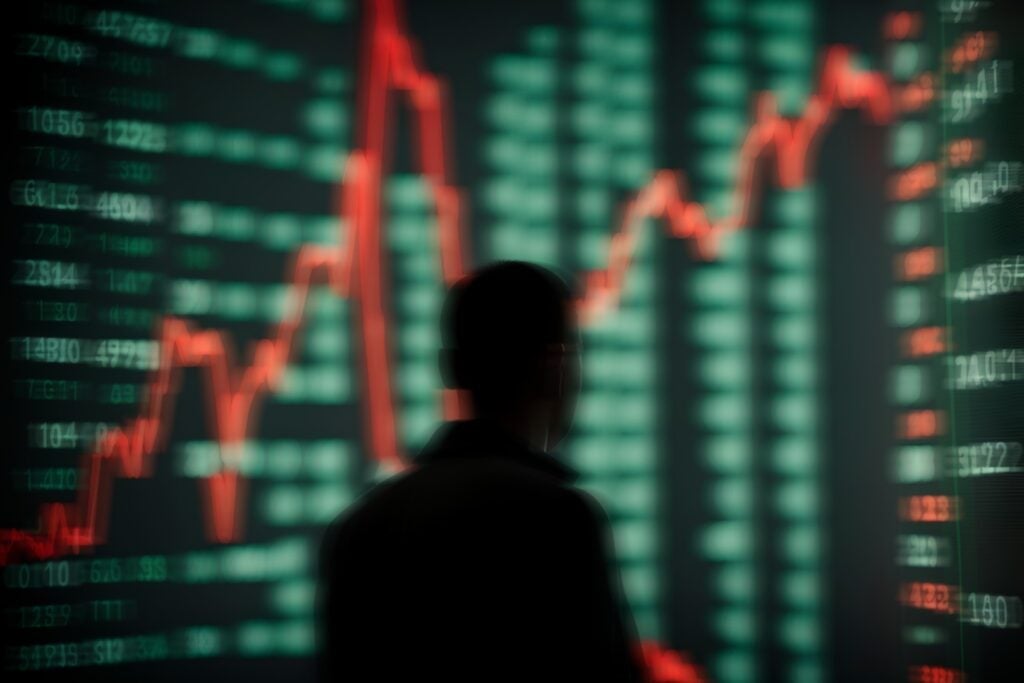
Wall Street’s sell-off shows no signs of easing into the week’s close, in what’s shaping up to be the worst week for U.S. equities since March 2020.
The market’s bleeding is now visible across the board: the Dow Jones has slipped into correction territory, while the tech-heavy Nasdaq 100 has entered a bear market after falling more than 20% from its highs.
Tech and semiconductor stocks have taken the brunt of the damage, following China’s announcement of retaliatory tariffs of 34% on U.S. goods — a tit-for-tat move matching the rate once imposed by President Donald Trump.
The VIX index — also known as the “market fear gauge” — spiked 35% to 40 levels, heading for the highest daily close since October 2020.
Other countries are threatening retaliation, fueling fears of a broader global trade war that could disrupt supply chains and weigh heavily on the global economy.
The iShares Semiconductor ETF SOXX — a key proxy for the U.S. chipmaking industry — has plunged 16% this week, on track for its worst performance since September 2001 at the height of the dot-com crash.
Apple Inc. AAPL extended its losses by another 4.7% on Friday, heading toward its steepest two-day decline since 2013, as investors brace for potential revenue hits from the new Chinese tariffs.
Even a strong U.S. jobs report — with 228,000 payrolls added in March, far above the expected 135,000 — did little to soothe nerves.
Hopes that Fed Chair Jerome Powell might strike a more dovish tone were dashed. He offered no signs of urgency to cut rates, reiterating that the Fed is in no rush, and flagged inflation risks tied to tariffs. Powell stressed the importance of monitoring inflation expectations closely.
Meanwhile, President Donald Trump continued posting on Truth Social, touting the “great jobs numbers” and warning China against behavior it “cannot afford to do.” He again pressed Powell to cut rates, saying it’s the “perfect time,” but his words seem to be losing sway on Wall Street.
As stocks slumped, bonds notched their best day of the year thus far. The popular iShares 20+ Year Treasury Bond ETF TLT fell 2.1%. Yields on the 10-year Treasury note were down by 10 basis points to 3.94%.
| Major Indices | Price | Chg (%) | |
| Dow Jones | 38,924.16 | -4.0% | |
| Nasdaq 100 | 17,616.59 | -4.9% | |
| S&P 500 | 5,130.61 | -4.9% | |
| Russell 2000 | 1,809.22 | -5.3% | |
According to Benzinga Pro data:
- The SPDR S&P 500 ETF Trust SPY sunk 4.6% to $512.41.
- The SPDR Dow Jones Industrial Average DIA fell 3.9% to $389.56.
- The tech-heavy Invesco QQQ Trust Series QQQ plummeted 4.8% to $428.85.
- The iShares Russell 2000 ETF IWM nosedived 5.4% to 179.40.
- The Energy Select Sector SPDR Fund XLE and the Financial Select Sector SPDR Fund XLF recorded the heaviest losses, down 7.3% and 6.1%, respectively.
- SanDisk Corporation SNDK plunged 24.66%.
- AppLovin Corporation APP fell 18.14%.
- New Fortress Energy Inc. NFE dropped 18.01%.
- Civitas Resources, Inc. CIVI sank 15.11%.
- Weatherford International plc WFRD declined 14.76%.
- TechnipFMC plc FTI fell 14.34%.
- Ovintiv Inc. OVV lost 13.62%.
- Rocket Companies, Inc. RKT surged 7.57%.
- Gap Inc. GAP rose 7.00%.
- TopBuild Corp. BLD jumped 6.49%.
- GameStop Corp. GME climbed 6.08%.
- NVR, Inc. NVR advanced 5.86%.
- D.R. Horton, Inc. DHI gained 6.09%.
Read Now:
Photo: RasyidArt via Shutterstock
Momentum77.15
Growth44.98
Quality83.61
Value7.46
Market News and Data brought to you by Benzinga APIs
© 2025 Benzinga.com. Benzinga does not provide investment advice. All rights reserved.
